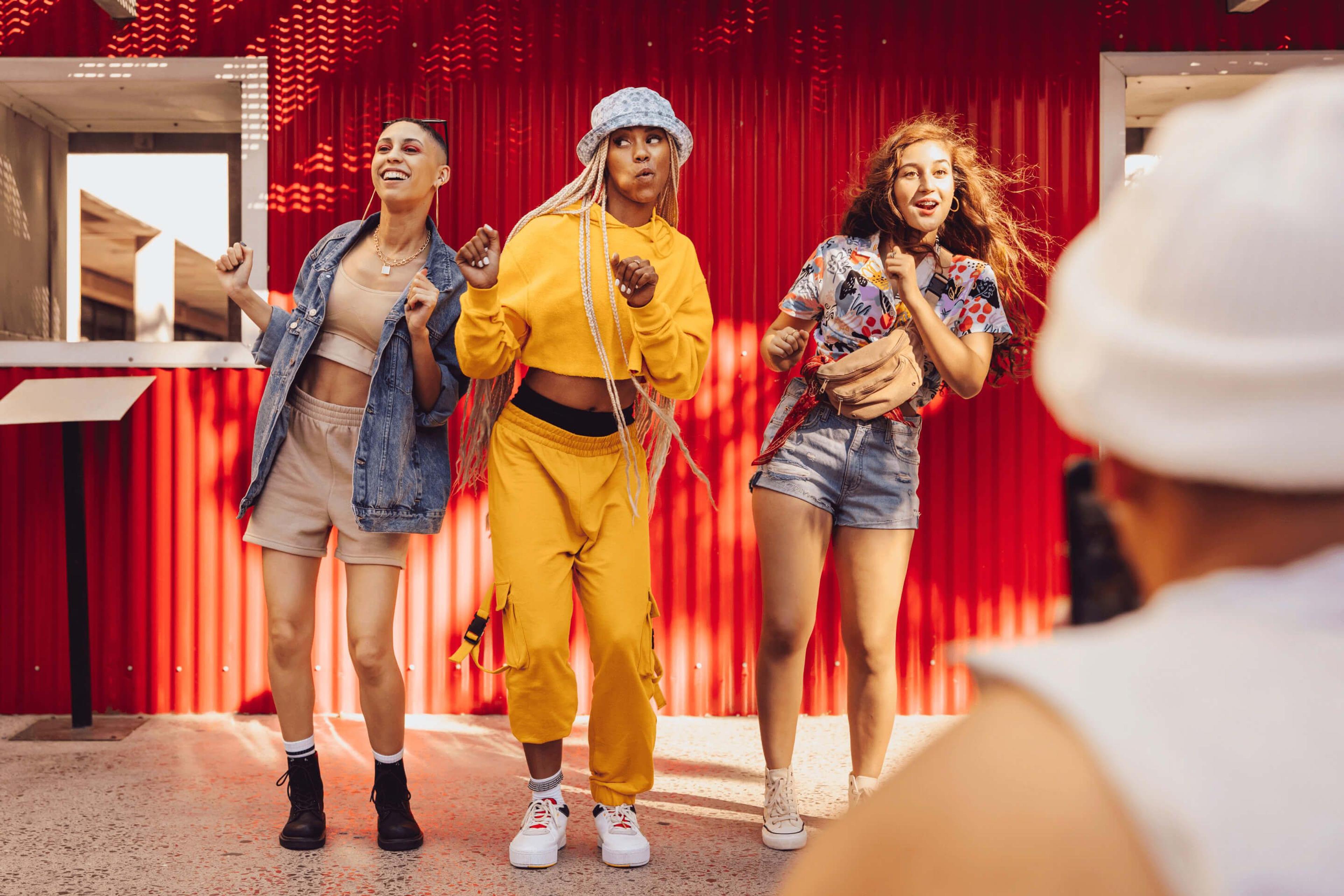Key takeaways
- There has been an almost 17 times increase in jobs mentioning TikTok since 2019-2020.
- A diverse range of sectors are seeking TikTok knowledge including Media & Marketing, Education, Non-Profit, Technology, and Healthcare employers.
- For employers, TikTok signals an interest in a wide range of skills: including content creation, graphic design, video editing, knowledge of the Adobe Creative Suite, and Google Analytics.
- Jobs mentioning TikTok have an application rate of 26 applications per every one job posted. Roles mentioning TikTok on average receive more applications than similar roles that do not mention the platform.
Introduction
Since its initial launch in 2016, TikTok has quickly outgrown its reputation as an entertainment app to become an education platform, podium for science communicators and medical professionals, and even White House outreach tool.
It’s no surprise then that the fastest-to-one-billion-users app has also emerged as a much desired skill by employers on the Handshake network. But what are employers actually looking for when they ask for TikTok skills? And are jobseekers, especially a digital-first generation that goes to video to make meaningful connections, actually applying?
To better understand how the video-first shift has affected early talent hiring, we analyzed almost ten thousand job descriptions from the Handshake network mentioning the video platform.
Below are four takeaways
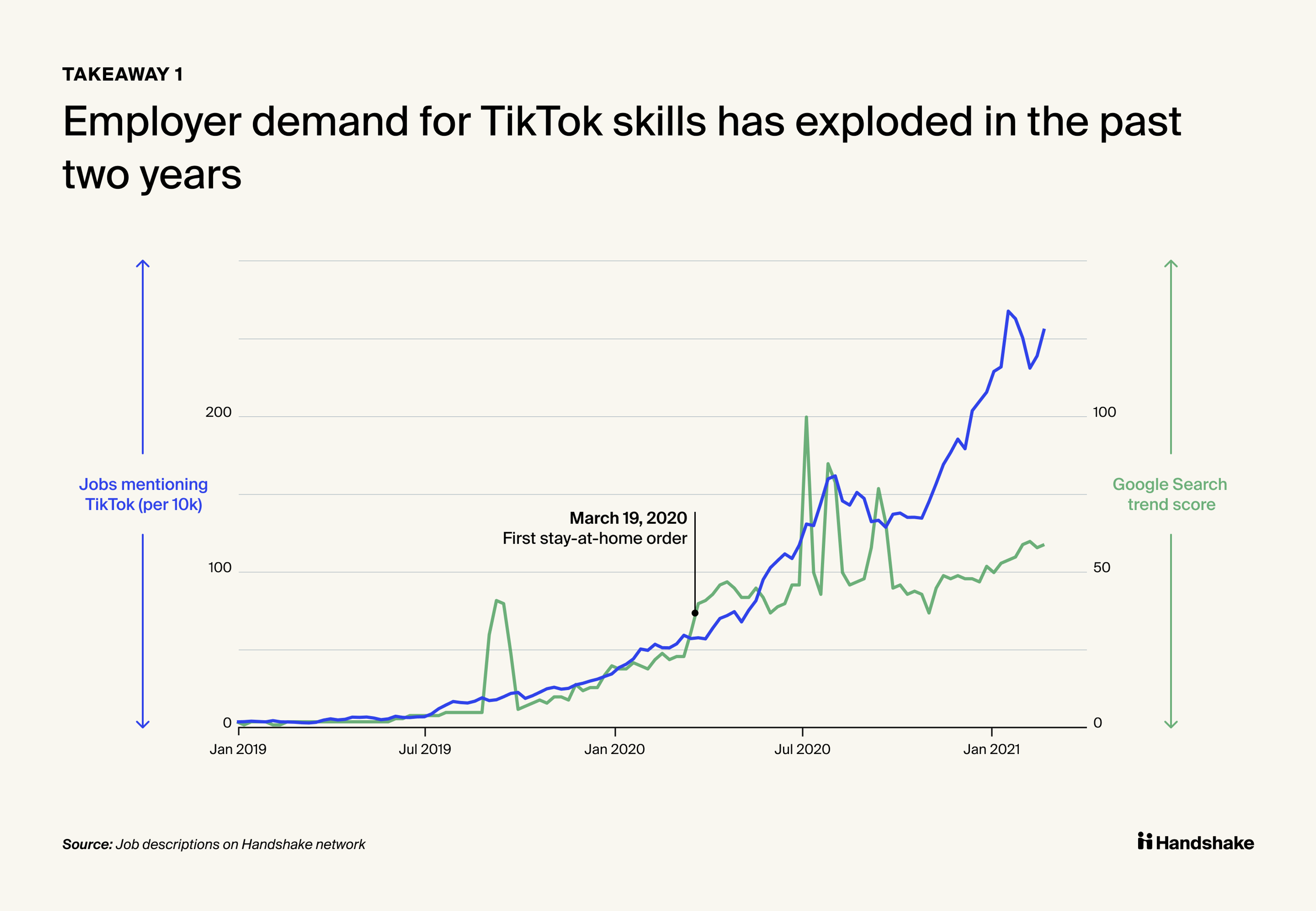
According to data from the Handshake network, jobs mentioning TikTok have seen an almost 17 times increase since the same time period in 2019-2020. This rapid rise in employer demand appears linked to two factors: first, mentions of TikTok skills coincided with the exponential growth of TikTok’s user base at the beginning during the first COVID-19 lockdown, during which time the app became the fastest social media platform to reach 1 billion users.
Second, TikTok growth is correlated with a broader demand for video-related skills in employer job descriptions (specifically, video editing and video production). This is in response to a larger shift toward video content: Cisco has predicted that by the end of 2022, online videos will make up more than 82% of all consumer internet traffic, 15 times greater than in 2017. In either case, employers are going where the eyes are and recruiting Gen Z talent to get them there.
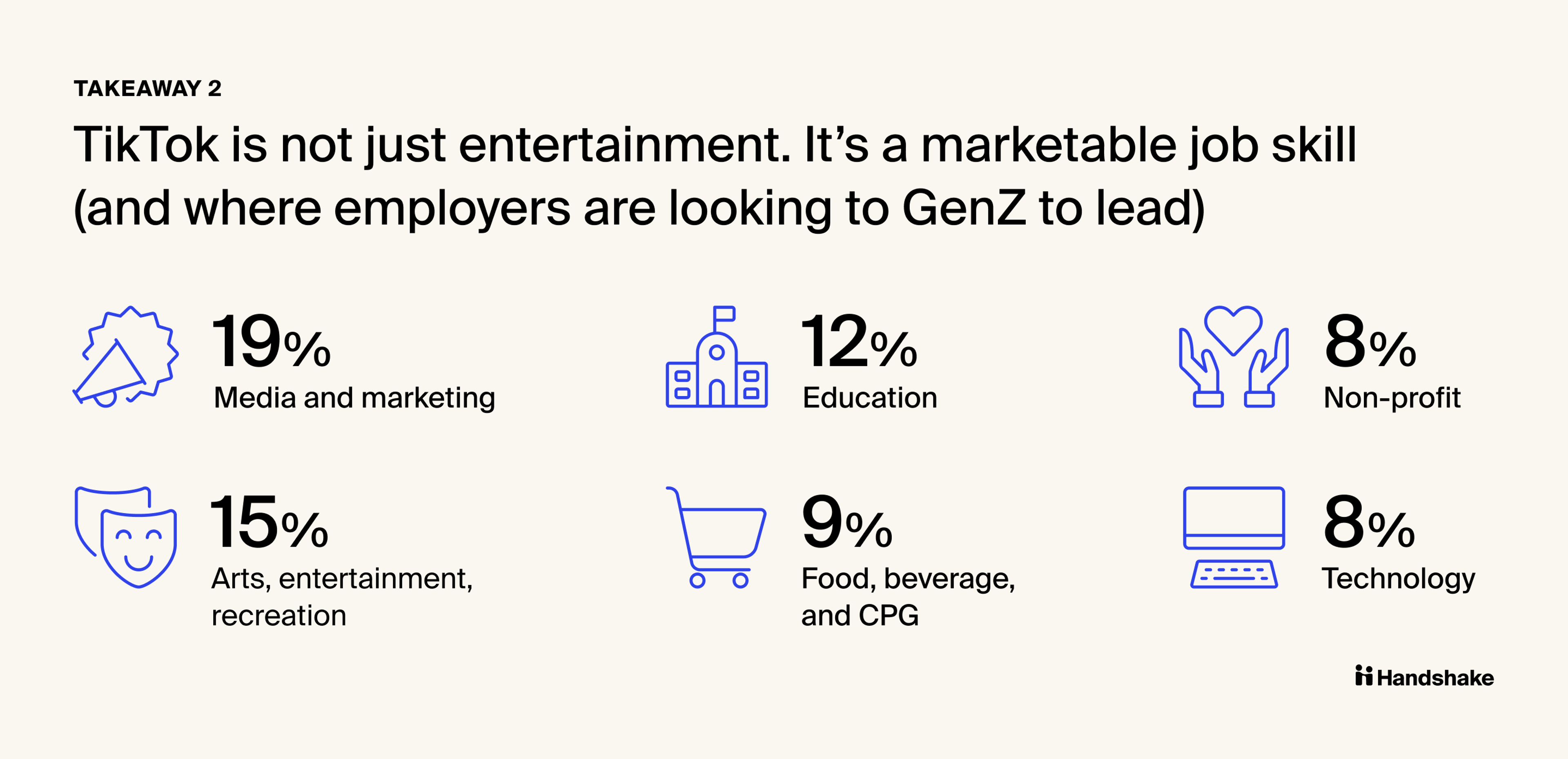
In what sectors are employers looking for TikTok skills? It turns out, all of them. The infographic above breaks down the sectors seeking TikTok knowledge: almost a fifth of jobs listing TikTok are in the Media & Marketing sector, followed by Arts & Entertainment (15%), Education (12%), Non-Profit (8%), Technology (8%), and Healthcare (3%). A closer read of job descriptions hint at the ways that employers across industries defer to prospective applicants to not only generate content, but create the broader digital marketing strategy: statements like “we want to create an environment where your creativity openly flows” and titles like “TikTok Guru” and “Junior Influencer Strategist” position applicants as the in-house experts.
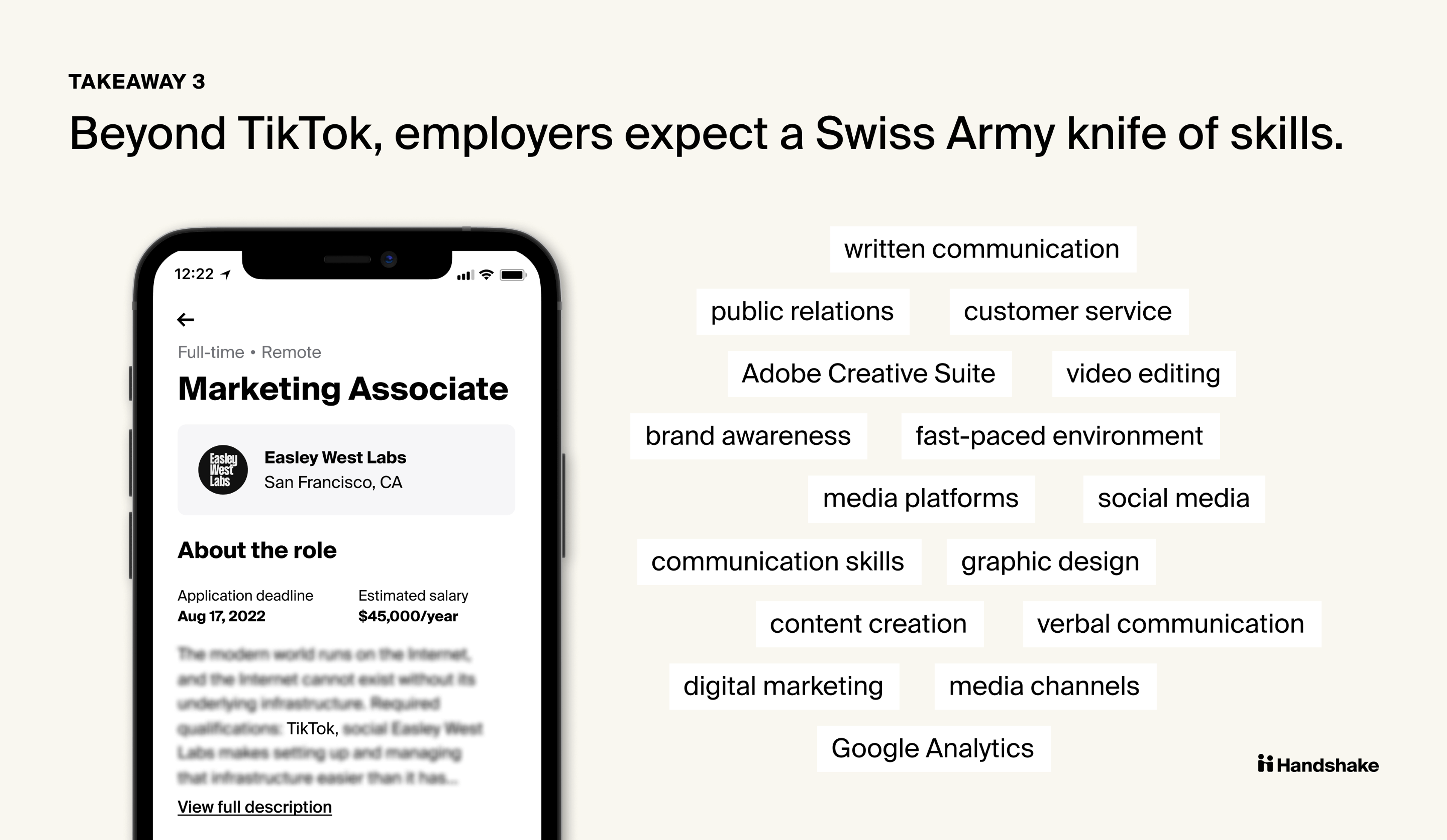
For employers, TikTok signals a need for a wide network of skills that include knowledge of emerging social media platforms, content creation, verbal and written communication skills, graphic design, video editing, knowledge of the Adobe Creative suite, and Google Analytics. The visual above displays the results of a text analysis identifying phrases most commonly associated with “TikTok”.
In other words, employers are looking to Gen Z employees to do it all. And unlike the other most highly occurring social media platforms (Facebook, Instagram, Twitter), TikTok’s focus on user-generated, organic video content indicates yet another tool expected to be in the applicant’s toolkit that once belonged to a more highly specialized role. This is confirmed when looking at the top job roles asking for TikTok skills: Marketing Specialists, Public Relations Specialists, Graphic Designers, followed by, to a much lesser extent, Camera Operators and Film Editors.
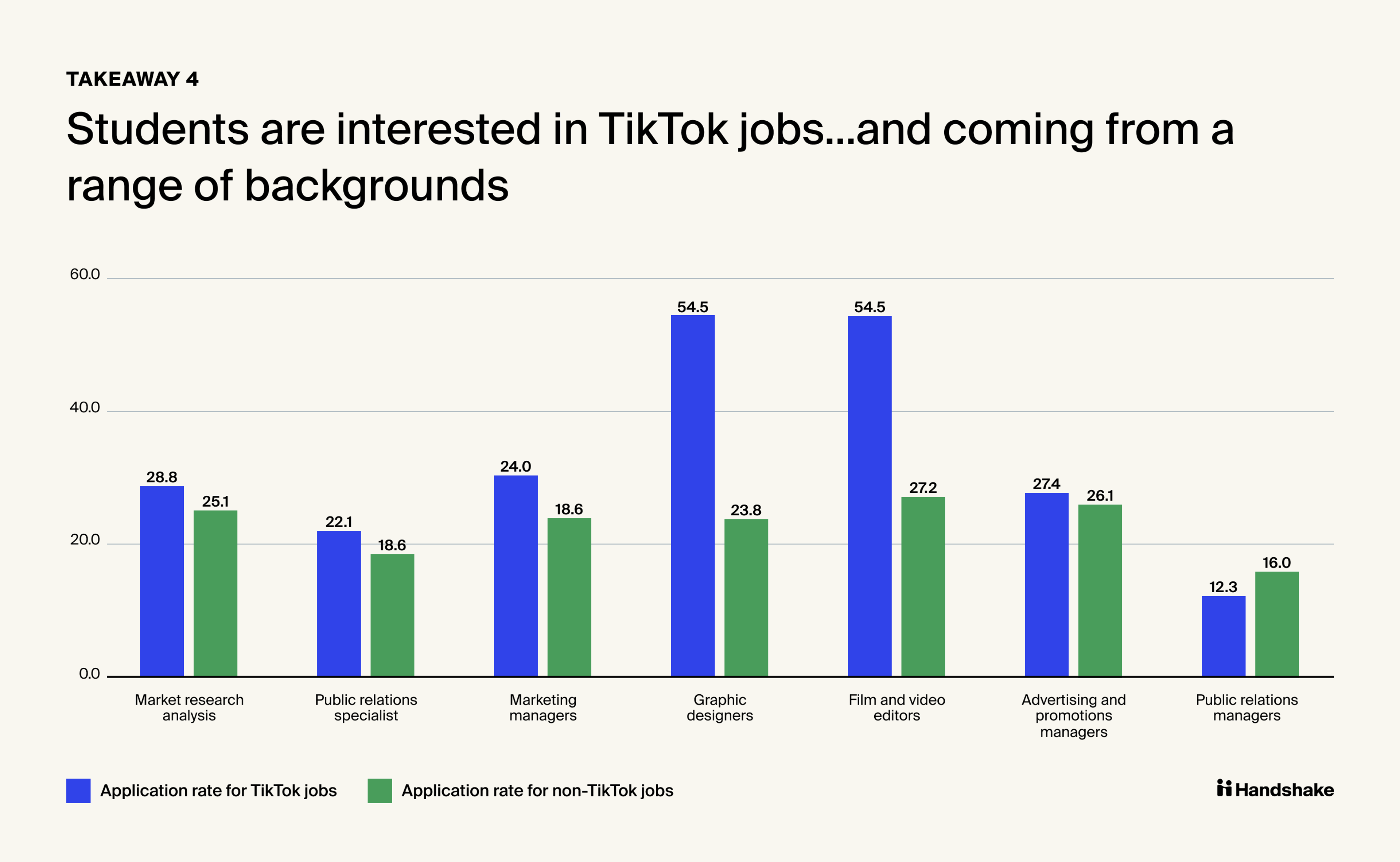
Like employers, applicants to these jobs are cutting across industries and degree types: while marketing majors make up the most applications for TikTok roles (11%), other majors include Business Administration (11%), Communication (4%), Economics (4%), Psychology (3%), and Communication Studies (2%).
With the exception of Public Relations Managers, roles mentioning TikTok had a higher number of applications per job than comparable jobs not mentioning the platform. Graph 2 compares the application rate (application to jobs) for job roles mentioning TikTok compared to those that do not mention the app. Interestingly, the highest largest gap in application rates are seen in Graphic Design and Film and Video Editor roles, where jobs mentioning TikTok in the past two years received more than twice as many applications compared to comparable jobs not mentioning the platform.
There are a few potential reasons for this:
- Interest in audience: jobs (and employers) mentioning the skillset may be in spaces that are more attractive to applicants than those that do not, with audiences that applicants are eager to engage with.
- Perceived employer competence: jobs (and employers) that see TikTok as a strategic channel are seen as being more competitive or forward-thinking than those who don’t.
- Applicant confidence: applicants may view the request for TikTok expertise as aligned with their own skillsets, encouraging them to apply.
Conclusion
Like the platform itself, employer demand (and applicant interest) in TikTok has exploded over the past two years. However, to focus only on the platform itself is to miss some of the key trends driving it:
- What this means for employers: For those already seeking out Gen Z talent to run social media platforms, think beyond TikTok to the underlying video-first transition that it represents. As well, consider the way this set of once-specialized skills (analytics, video editing, content creation, graphic design) are converging into single roles—and make sure the role speaks to the other factors that Gen Z is seeking in their next job. Finally, be sure to integrate your “TikTok Gurus” into the larger organizational culture to ensure they’re ready to adapt to the next communication channel.
- What this means for jobseekers: TikTok (and user-generated content) is a marketable job skill, but it's not the only skill employers are looking for. Lean into the underlying competencies that the platform is speaking to: digital marketing toolkits, video editing, brand awareness. How will you talk about these skills 2 years from now?
@joinhandshake Spending time on TikTok = working on your career 😎🚀 #landajob #JoinHandshake #tiktokskills #careeradvice ♬ original sound - Handshake
